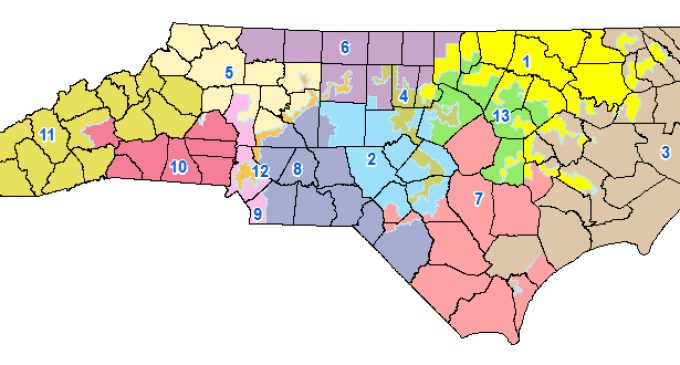Top U.S. court orders review of maps

By GARY D. ROBERTSON, Associated Press
RALEIGH —The U.S. Supreme Court on Monday threw out a North Carolina court ruling that upheld Republican-drawn electoral districts for state and congressional lawmakers.
State judges were told to look at whether lawmakers depended too much on race in drawing boundaries that increased minority representation in Raleigh but also boosted GOP fortunes.
In a two-sentence order, the justices told the North Carolina Supreme Court to revisit its decision last December upholding the maps, and to review it in light of the U.S. high court’s decision last month involving Alabama legislative districts.
In that case, the justices ruled a lower court used the wrong test when it upheld legislative districts and determined that race was not the primary motivating factor in drawing boundary lines. As in the North Carolina case, critics of the Alabama maps argued the Republican-led legislature there illegally packed black voters into voting districts that reduced their power.
“I’m pleased with the decision to vacate the decision of the N.C .Supreme Court,” said N.C. Rep. Ed Hanes, a Democrat representing District 72 in Forsyth County. “Our position from the beginning has been that the current district lines are unconstitutional. There seems to be a clear connection between how the current lines are drawn and the stacking of African-Americans into the same districts. While this has resulted in more African-Americans being elected, it has also caused a drastic imbalance to our party politic.
“The U.S. Supreme Court has asked our [N.C. Supreme] Court to start over with a different test for constitutionality, and I agree with that position.”
In both states, Republicans strengthened their grip on power through redistricting based on the 2010 census. North Carolina Republicans, who took over the legislature in early 2011, now hold 10 of the state’s 13 congressional seats and 108 of the 170 seats in the legislature.
Election and civil rights advocacy groups and Democratic voters who sued over the 2011 maps praised the justices’ ruling Monday, which came after they asked the Supreme Court in January to consider the case. Within hours of the ruling, they presented proposed schedules to the state Supreme Court with the goal of settling the litigation before the 2016 election cycle. Candidate filing begins next February.
“The redistricting plans which the General Assembly created were illegal because they were racially gerrymandered,” said the Rev. William Barber, president of the North Carolina NAACP chapter. “They were intended to violate the political presence and the participation of racial minorities.” New boundaries will have to be drawn, Barber predicted.
A pair of legal challenges focused on 27 state House and Senate districts and three congressional districts. In many districts, Democratic-leaning black voters were placed within boundaries that ultimately benefited Republicans elsewhere in the state. A three-judge panel of state trial judges unanimously upheld the maps in 2013. A majority of state justices determined the districts withstood legal scrutiny whether or not race had been the predominant factor in drawing them.
Republicans who led the 2011 mapmaking committees said Monday’s decision was “procedural” and not unanticipated. They believe the maps are lawful and designed to protect the state from legal claims under the federal Voting Rights Act.
“We are confident that our state Supreme Court will once again arrive at the same result and the U.S. Supreme Court will affirm its decision,” Rep. David Lewis, R-Harnett, and Sen. Bob Rucho, R-Mecklenburg, said in a written statement.
In the Alabama case, Justice Stephen Breyer said lawmakers and a lower court relied too much on a “mechanically numerical” view of whether the new plan reduced minority voting strength. Breyer wrote that the court should have asked what percentages were necessary for minorities to elect their candidate of choice.
In earlier N.C. redistricting, Democrats in charge of maps adopted a similar strategy that resulted in cutting back the percentages of black voters in majority-black districts. They kept more black voters in districts with white Democrats where combined they could influence election outcomes. N.C. legislative Republicans contend the two cases are different because their legal defense is based on a different portion of the Voting Rights Act than the Alabama case. The number of minority legislators has reached record numbers in the N.C. General Assembly since the latest round of redistricting. In the 2009 legislative session, when Democrats were in charge, there were 30 black legislators. There are 34 black lawmakers today.










